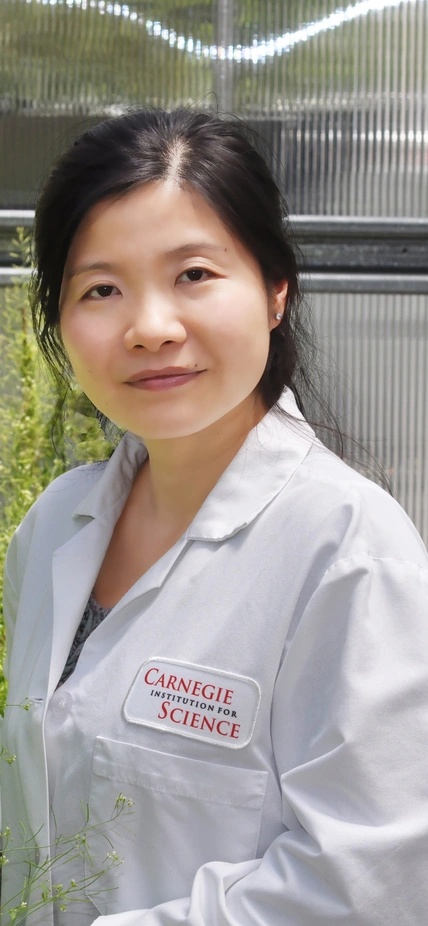Washington, D.C.--Plant Biology postdoctoral research associate since 2012, Jia-Ying Zhu was awarded the sixth PIE award for her creativity, productivity, being a great team player in research, “and also an active and caring member of the Carnegie Department of Plant Biology (DPB) community.” The Postdoctoral Innovation and Excellence Awards are made through nominations from the department directors and chosen by the Office of the President. They recognize exemplary accomplishments in science, education, and community service.
Jia-Ying has made many innovative contributions to our understanding of the molecular mechanisms that control plant growth according to hormonal, nutritional, and environmental conditions. Several studies elegantly answer the long-standing question of how multiple hormonal and environmental signals co-regulate cell elongation and growth in response to light and temperature.
Her early works demonstrated direct regulation of a light-responsive protein by a steroid activated transcription factor—a protein that controls the rate of gene activation—which bridges the signaling cascades of molecules that react to light and the steroid hormone in regulating cell elongation and seedling growth. She also made key contributions to the identification of co-repressor of gene expression, which is key to integrating environmental and steroid signals, and the discovery of direct integration of different molecular signaling pathways that regulate plant shoot growth.
In addition to other work, Jia-Ying is a lead author of a paper published on Nature Communications. She uncovered a key mechanism for adapting to heat stresses in natural day-night conditions. The study explains how the biological circadian clock helps plants monitor natural temperature fluctuations and alter growth to deal with heat stresses. Another major discovery from Jia-Ying’s research was just accepted for publication in Molecular Cell. Her studies provide a clear understanding the molecular cascade that shows how a specific steroid signaling (BR) inhibits a catalytic enzyme (GSK3) that is important to many different metabolic reactions.
Jia-Ying is always willing to go above and beyond the call of duty to help her colleagues and to mentor students. She is a member of the Carnegie Institution Postdoc Association Council for Plant Biology, and she joins in the planning and organization of postdoctoral social activities, the department retreat, and holiday parties. She was also a volunteer for Fascination of Plants Day at the department.
Carnegie President Matthew Scott remarked, “Jia-Ying is not only an exemplary member of Plant Biology, she represents a level of excellence and community service that Carnegie postdoctoral researchers have become known for. We congratulate her on her accomplishments.”
One postdoc is honored every quarter for their extraordinary accomplishments with the PIE Award. The award recipient is given a prize of $1,000, and is the guest of honor at a departmental gathering where all postdocs can enjoy some celebratory pies.
